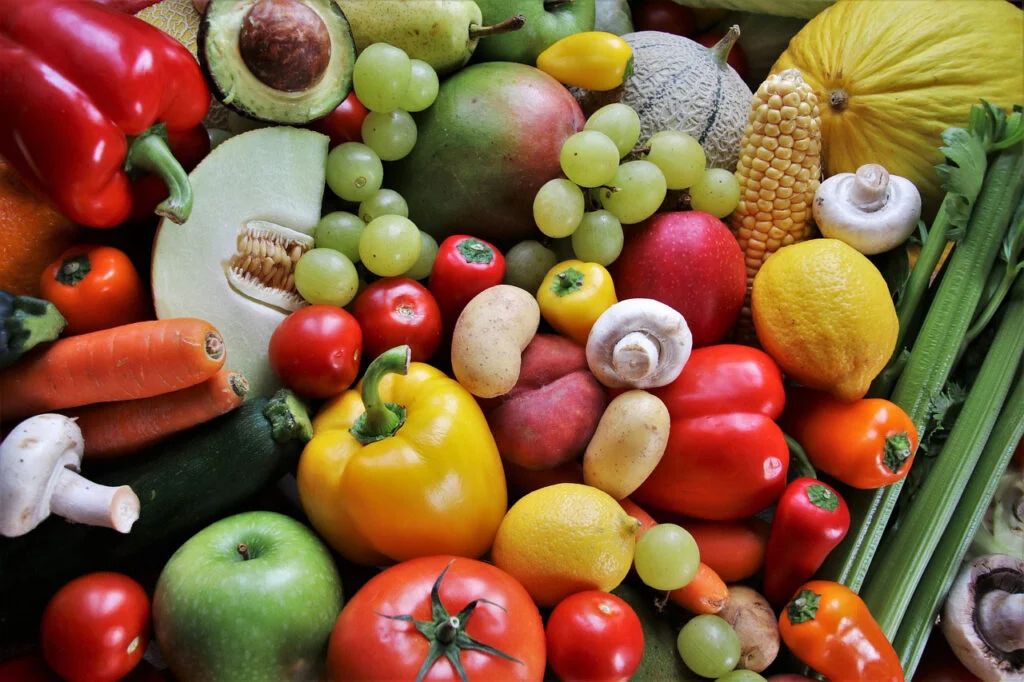
When it comes to feeling healthy and refreshed, prioritizing sleep is non-negotiable. But whether it’s falling asleep, staying asleep, or feeling rested in the morning, we all experience challenges from time to time. There are some simple habits most of us know can make it easier to get a good night’s sleep. For instance, going to bed and waking up at the same time every day, creating a sleep-promoting environment, and avoiding blue light and caffeine close to bedtime.
One of the lesser talked-about factors in sleep is diet, but research shows that good nutrition and sleep are like peanut butter and jelly. They just go together! Let’s examine what to eat more of — and less of — to help you catch better Z’s.
Note: The content on Sleepopolis is meant to be informative in nature, but it shouldn’t be taken as medical advice, and it shouldn’t take the place of medical advice and supervision from a trained professional. If you feel you may be suffering from any sleep disorder or medical condition, please see your healthcare provider immediately. Additionally, restrictions and regulations on supplements may vary by location. If you ever have any questions or concerns about a product you’re using, contact your doctor.
Long Story Short
- Your everyday food choices can influence your sleep patterns, and how you sleep at night can influence the food choices you make, including cravings.
- The best diet for better sleep prioritizes foods like fruits, vegetables, whole grains, legumes, nuts, and seeds that provide omega-3 fats, fiber, and lean protein, as well as nutrients like magnesium, tryptophan, melatonin, and calcium.
- Ultra-processed foods that are high in added sugar, sodium, and saturated fat, as well as caffeine and alcohol, are more likely to disrupt sleep and can worsen conditions like sleep apnea and acid reflux.
How Nutrition Affects Sleep
Nutrition is an evolving science, but one thing’s for sure: what we’re eating impacts literally every aspect of our health, including sleep. This means the food choices you’ve been making all week could very well play a role in how rested you feel tomorrow morning. More specifically, things like meal timing, nutrients, and even portion sizes (overeating or undereating) help shape your sleep patterns.
Your body’s biological clock is called your circadian rhythm — it regulates your sleeping, waking, thirst, hunger, energy consumption, and metabolism. These aren’t aspects of your health that you generally have to think about because your circadian rhythm works almost on autopilot in response to your lifestyle habits.
Your digestive system is impacted by your circadian rhythm too; for example, a change in the way you’re eating can trigger a change in your sleep pattern. On the other hand, a change in the way you’ve been sleeping affects things like the way energy is used and stored and the types of foods you’re craving.
Additionally, inadequate sleep is linked to an increase in appetite-regulating hormones, like ghrelin and leptin. Ghrelin, which stimulates hunger, tends to rise when you aren’t getting enough high-quality sleep, while leptin, the hormone that signals fullness, decreases. This hormonal imbalance can trigger cravings, particularly for high-calorie, sugary, carbohydrate-rich foods, as the body seeks fast energy to combat fatigue.
The Nutrients That Help Us Sleep
The best way to support better sleep through diet is to prioritize foods that contribute an array of nutrients. Incorporating a variety of fruits, vegetables, legumes, nuts, seeds, and whole grains provides a balance of vitamins, minerals, fiber, antioxidants, proteins, and healthy fats your body needs. Emphasizing a few specific nutrients may be particularly helpful for your circadian rhythm.
Tryptophan
Sandra Chavez, MS, RD says several foods naturally contain tryptophan, an amino acid that, when lacking, has been associated with poor sleep. Tryptophan becomes vitamin B3, also known as niacin, which then turns into serotonin, a brain chemical involved in mood and relaxation. Serotonin, in turn, is converted into melatonin, the hormone responsible for regulating sleep-wake cycles.
Some foods that are either rich in tryptophan or promote serotonin production include:
- Bananas
- Hazelnuts
- Wild rice
- Spinach
- Lettuce
- Strawberries
- Pineapple
- Kiwi
- Turkey
“These foods don’t have to be eaten at bedtime,” says Chavez. She continues, “Rather, adopting an overall diet that delivers enough tryptophan can be a great move towards better sleep.”
Certain holiday foods like turkey increase serotonin and blood sugar, so if you’re not able to take a nice walk or play an energetic game outside to tap into all that new energy, fatigue sets in. “While [tryptophan] has long been deemed the culprit of a post-meal snooze; it is more so a compound effect of our intake and selections rather than any one food triggering the couch to call us,” explains Courtney Southwood, MS, RDN, LDN, a practicing registered dietitian with more than a decade of experience.
Magnesium
Magnesium plays a crucial role in promoting relaxation and calming your nervous system, making it easier to fall asleep. Additionally, magnesium helps regulate levels of the brain chemical GABA, which has calming effects on your brain.
Registered dietitian and author of Eat To Sleep: What To Eat & When To Eat It for a Good Night’s Sleep Karman Meyer tells Sleepopolis, “The first nutrient I focus on with many clients is magnesium. It’s like nature’s gentle sleep aid, helping relax the muscles and calm the mind, making it easier to drift off and stay asleep.”
Magnesium-Rich Foods
Meyer recommends skipping sleep supplements if possible and instead reaching for foods with magnesium, such as:
- Leafy greens, like spinach
- Nuts and seeds, like almonds and pumpkin seeds
- Whole grains
- Avocados
- Dark chocolate
Melatonin
Melatonin is a hormone produced by the pineal gland in the brain and helps regulate the sleep-wake cycle. It’s released in response to darkness, signaling to the body that it’s time to sleep. Some foods contain small amounts of melatonin, such as:
- Tart cherries
- Grapes
- Walnuts
- Rice
- Eggs
- Tomatoes
However, it’s unlikely that most people consume enough food-derived melatonin to make a significant difference in their sleep patterns. Because of this, man-made melatonin supplements are popular; however, they’re generally intended for short-term use such as recovering from jet lag, and long-term safety research is limited.
Calcium
Not just good for building strong bones, calcium helps regulate the production of melatonin. Additionally, calcium helps your brain use tryptophan to produce serotonin, a brain chemical that further aids in relaxation and sleep. Some of the best food sources of calcium are:
- Tofu made with calcium sulfate
- Canned fish that contain edible bones, like salmon or sardines
- Dark leafy greens, like kale, collard greens, and bok choy
- Calcium-fortified foods like certain cereals, orange juice, cow’s milk, and plant-based milk
The Foods That Make it Hard to Sleep
While you’re designing a diet that includes sleep-promoting foods, it’s equally important to reduce the types of foods that have the opposite effect, especially close to bedtime. Some foods and beverages that can make it challenging to fall asleep or stay asleep include:
- Caffeine-containing items: Coffee, tea, energy drinks, and chocolate can stimulate the nervous system, leading to increased alertness and difficulty winding down.
- Spicy foods: These may cause indigestion and heartburn, making it uncomfortable to lie down and relax.
- High-fat and heavy meals: Eating these foods close to bedtime can lead to discomfort and may cause disruptions in sleep.
- Sugary snacks and refined carbohydrates: These types of ultra-processed items can cause fluctuations in your blood sugar levels, potentially leading to restless sleep.
- Alcohol: Harvard Health reports that the sedative effects of alcohol contribute to feeling drowsy. While initially sedating, drinking alcohol can disrupt sleep cycles and lead to frequent awakenings later in the night. Alcohol use might also contribute to a sleep disorder known as microsleep, which is when you unintentionally nod off without warning.
Is There an Ideal Diet for Sleep?
Achieving better sleep through food begins with adopting a balanced diet that supports relaxation and maintains stable blood sugar levels throughout the day. A diet rich in nutrient-dense foods such as fruits, vegetables, lean proteins, whole grains, and healthy fats can promote better sleep quality.
Chavez says, “While there is no one perfect diet for every person, generally a Mediterranean-style eating pattern contains a balance of nutrition that promotes good sleep.” She notes, “A healthy dose of omega-3’s from fatty fish and some nuts, complex carbohydrates, and lean proteins are just a few of the sleep-promoting benefits of this eating style.”
Furthermore, incorporating foods that provide tryptophan, magnesium, and calcium can aid in the production of sleep-promoting chemicals like serotonin and melatonin. Limiting caffeine and alcohol intake, particularly close to bedtime, can also help regulate sleep-wake cycles and promote restful sleep.
Establishing regular meal times and avoiding heavy, spicy, or fatty meals close to bedtime can further support a healthy sleep pattern. Ultimately, focusing on a well-rounded diet with attention to timing and nutrient composition is a good place to start. (1)
Can an Unhealthy Diet Impact Sleep Disorders?
The relationship between nutrition and sleep is also apparent in some sleep disorders. Consuming a diet full of ultra-processed foods, which tend to be high in added sugars, sodium, and saturated fats, has been linked to various sleep disturbances.
For example, obstructive sleep apnea (OSA) can be worsened by an unhealthy diet and alcohol use. Research shows that diets high in saturated fat, processed meats, and ultra-processed snack foods are associated with more frequent and severe breathing-related night wakings among people with OSA.
It’s important to address sleep apnea as, not only does it disrupt your rest, but it’s also a risk factor for other conditions, like diabetes and heart disease.
Amy Beney, MS, RD, CDCES tells Sleepopolis, “A recent [2021] study showed that those with a diet higher in fruits was associated with a reduced risk of sleep apnea versus a diet higher in animal innards, fried foods, salted foods, carbonated beverages, and non-carbonated beverages.”
These types of foods, which make up much of the standard American diet, can disrupt the body’s natural sleep-wake cycle and interfere with the production of sleep-regulating hormones like melatonin and serotonin. The time you eat matters, too: eating late at night can also worsen symptoms of sleep apnea.
How Sleep Affects Nutrition
How you sleep affects your food choices (and overall nutrition), and the quality of your food choices affects how you sleep.
For one thing, when you don’t sleep well, this can knock your appetite-regulating hormones out of balance, triggering cravings for high-calorie and sugary foods. Your body’s ability to keep your blood sugar within healthy levels can also be thrown off track.
Plus, think about the last time you didn’t sleep well for a couple of days. You probably didn’t make the best decisions thanks to brain fatigue, and you may have had a hard time choosing healthy foods.
Getting your sleep on track supports a healthy hormonal balance and helps your body function properly. This makes it easier to make better food choices and support your overall well-being.
Can Sleep Help You Lose Weight?
Getting enough sleep isn’t just crucial for health and wellness but can also play a significant role in weight management. Experts recommend adults get 7–9 hours of quality sleep per night. This may help promote normal hormonal balance and metabolism, which can support weight loss efforts. Not to mention, being well-rested leaves you with more energy, which may make it easier to take that afternoon walk or make healthier food choices.
FAQs
Does eating a lot for dinner make you sleep better?
Can a low-carb diet cause sleep problems?
The Last Word From Sleepopolis
It’s common for many people to have a few extra glasses of cheer during the holidays. Harvard Health reports that the sedative effects of alcohol contribute to feeling drowsy. And if you also feel overly full, you’re much more likely to take a cat nap. Alcohol use might also contribute to a sleep disorder known as microsleep, which is when you unintentionally nod off without warning.
Nutrition and sleep are strongly linked, and looking for opportunities to improve your diet is a worthy cause. Try to cut back on the ultra-processed foods and add in more of the good stuff, including foods that contribute more magnesium, tryptophan, and calcium to your diet.
Sources
- Alruwaili NW, Alqahtani N, Alanazi MH, et al. The effect of nutrition and physical activity on sleep quality among adults: a scoping review. Sleep Science Practice 7, 8 (2023). https://doi.org/10.1186/s41606-023-00090-4
- Reddy S, Reddy V, Sharma S. Physiology, Circadian Rhythm. [Updated 2023 May 1]. In: StatPearls [Internet]. Treasure Island (FL): StatPearls Publishing; 2024 Jan-. Available from: https://www.ncbi.nlm.nih.gov/books/NBK519507/
- Segers A, Depoortere I. Circadian clocks in the digestive system. Nat Rev Gastroenterol Hepatol. 2021;18(4):239-251. doi:10.1038/s41575-020-00401-5
- van Egmond LT, Meth EMS, Engström J, et al. Effects of acute sleep loss on leptin, ghrelin, and adiponectin in adults with healthy weight and obesity: A laboratory study. Obesity (Silver Spring). 2023;31(3):635-641. doi:10.1002/oby.23616
- Gasperi V, Sibilano M, Savini I, Catani MV. Niacin in the Central Nervous System: An Update of Biological Aspects and Clinical Applications. Int J Mol Sci. 2019;20(4):974. Published 2019 Feb 23. doi:10.3390/ijms20040974
- Kikuchi AM, Tanabe A, Iwahori Y. A systematic review of the effect of L-tryptophan supplementation on mood and emotional functioning. J Diet Suppl. 2021;18(3):316-333. doi:10.1080/19390211.2020.1746725
- Savage RA, Zafar N, Yohannan S, et al. Melatonin. [Updated 2022 Aug 8]. In: StatPearls [Internet]. Treasure Island (FL): StatPearls Publishing; 2024 Jan-. Available from: https://www.ncbi.nlm.nih.gov/books/NBK534823/
- Briguglio M, Dell’Osso B, Panzica G, et al. Dietary Neurotransmitters: A Narrative Review on Current Knowledge. Nutrients. 2018;10(5):591. Published 2018 May 10. doi:10.3390/nu10050591
- Pickering G, Mazur A, Trousselard M, et al. Magnesium Status and Stress: The Vicious Circle Concept Revisited. Nutrients. 2020;12(12):3672. Published 2020 Nov 28. doi:10.3390/nu12123672
- Fiorentini D, Cappadone C, Farruggia G, Prata C. Magnesium: Biochemistry, Nutrition, Detection, and Social Impact of Diseases Linked to Its Deficiency. Nutrients. 2021;13(4):1136. Published 2021 Mar 30. doi:10.3390/nu13041136
- Binks H, E Vincent G, Gupta C, Irwin C, Khalesi S. Effects of Diet on Sleep: A Narrative Review. Nutrients. 2020;12(4):936. Published 2020 Mar 27. doi:10.3390/nu12040936
- Kennaway DJ . Melatonin rich foods in our diet: food for thought or wishful thinking?. Food Funct. 2020;11(11):9359-9369. doi:10.1039/d0fo02563a
- Tuft C, Matar E, Menczel Schrire Z, Grunstein RR, Yee BJ, Hoyos CM. Current Insights into the Risks of Using Melatonin as a Treatment for Sleep Disorders in Older Adults. Clin Interv Aging. 2023;18:49-59. Published 2023 Jan 12. doi:10.2147/CIA.S361519
- Sánchez-Sánchez AM, Turos-Cabal M, Puente-Moncada N, Herrera F, Rodríguez C, Martín V. Calcium acts as a central player in melatonin antitumor activity in sarcoma cells. Cell Oncol (Dordr). 2022;45(3):415-428. doi:10.1007/s13402-022-00674-9
- Plantz MA, Bittar K. Dietary Calcium. [Updated 2022 Dec 5]. In: StatPearls [Internet]. Treasure Island (FL): StatPearls Publishing; 2024 Jan-. Available from: https://www.ncbi.nlm.nih.gov/books/NBK549792/
- Gardiner C, Weakley J, Burke LM, et al. The effect of caffeine on subsequent sleep: A systematic review and meta-analysis. Sleep Med Rev. 2023;69:101764. doi:10.1016/j.smrv.2023.101764
- Zhang M, Hou ZK, Huang ZB, Chen XL, Liu FB. Dietary and Lifestyle Factors Related to Gastroesophageal Reflux Disease: A Systematic Review. Ther Clin Risk Manag. 2021;17:305-323. Published 2021 Apr 15. doi:10.2147/TCRM.S296680
- Theorell-Haglöw J, Lemming EW, Michaëlsson K, Elmståhl S, Lind L, Lindberg E. Sleep duration is associated with healthy diet scores and meal patterns: results from the population-based EpiHealth study. J Clin Sleep Med. 2020;16(1):9-18. doi:10.5664/jcsm.8112
- Mantantzis K, Campos V, Darimont C, Martin FP. Effects of Dietary Carbohydrate Profile on Nocturnal Metabolism, Sleep, and Wellbeing: A Review. Front Public Health. 2022;10:931781. Published 2022 Jul 13. doi:10.3389/fpubh.2022.931781
- He S, Hasler BP, Chakravorty S. Alcohol and sleep-related problems. Curr Opin Psychol. 2019;30:117-122. doi:10.1016/j.copsyc.2019.03.007
- Mohammadi S, Lotfi K, Mokhtari E, Hajhashemy Z, Heidari Z, Saneei P. Association between Mediterranean dietary pattern with sleep duration, sleep quality and brain derived neurotrophic factor (BDNF) in Iranian adults. Sci Rep. 2023;13(1):13493. Published 2023 Aug 18. doi:10.1038/s41598-023-40625-4
- Scoditti E, Tumolo MR, Garbarino S. Mediterranean Diet on Sleep: A Health Alliance. Nutrients. 2022;14(14):2998. Published 2022 Jul 21. doi:10.3390/nu14142998
- Delpino FM, Figueiredo LM, Flores TR, et al. Intake of ultra-processed foods and sleep-related outcomes: A systematic review and meta-analysis. Nutrition. 2023;106:111908. doi:10.1016/j.nut.2022.111908
- Bove C, Jain V, Younes N, Hynes M. What You Eat Could Affect Your Sleep: Dietary Findings in Patients With Newly Diagnosed Obstructive Sleep Apnea. Am J Lifestyle Med. 2018;15(3):305-312. Published 2018 Apr 27. doi:10.1177/1559827618765097
- Du Y, Duan X, Zheng M, et al. Association Between Eating Habits and Risk of Obstructive Sleep Apnea: A Population-Based Study. Nat Sci Sleep. 2021;13:1783-1795. Published 2021 Oct 9. doi:10.2147/NSS.S325494
- Lopes TDVC, Borba ME, Lopes RDVC, et al. Eating Late Negatively Affects Sleep Pattern and Apnea Severity in Individuals With Sleep Apnea. J Clin Sleep Med. 2019;15(3):383-392. Published 2019 Mar 15. doi:10.5664/jcsm.7658
- Singh T, Ahmed TH, Mohamed N, et al. Does Insufficient Sleep Increase the Risk of Developing Insulin Resistance: A Systematic Review. Cureus. 2022;14(3):e23501. Published 2022 Mar 26. doi:10.7759/cureus.23501
- Papatriantafyllou E, Efthymiou D, Zoumbaneas E, Popescu CA, Vassilopoulou E. Sleep Deprivation: Effects on Weight Loss and Weight Loss Maintenance. Nutrients. 2022;14(8):1549. Published 2022 Apr 8. doi:10.3390/nu14081549
- Martin J, Huang H, Johnson R, et al. Association between Self-reported Sleep Quality and Single-task Gait in Young Adults: A Study Using Machine Learning. Sleep Sci. 2023;16(4):e399-e407. Published 2023 Nov 22. doi:10.1055/s-0043-1776748
- Theorell-Haglöw J, Lemming EW, Michaëlsson K, Elmståhl S, Lind L, Lindberg E. Sleep duration is associated with healthy diet scores and meal patterns: results from the population-based EpiHealth study. J Clin Sleep Med. 2020;16(1):9-18. doi:10.5664/jcsm.8112
- Gangitano E, Baxter M, Voronkov M, Lenzi A, Gnessi L, Ray D. The interplay between macronutrients and sleep: focus on circadian and homeostatic processes. Front Nutr. 2023;10:1166699. Published 2023 Aug 23. doi:10.3389/fnut.2023.1166699
- Karman Meyer. Personal Interview. February, 2024.
- Amy Beney. Personal Interview. February, 2024.
- Sandra Chavez. Personal Interview. February 2024.




























